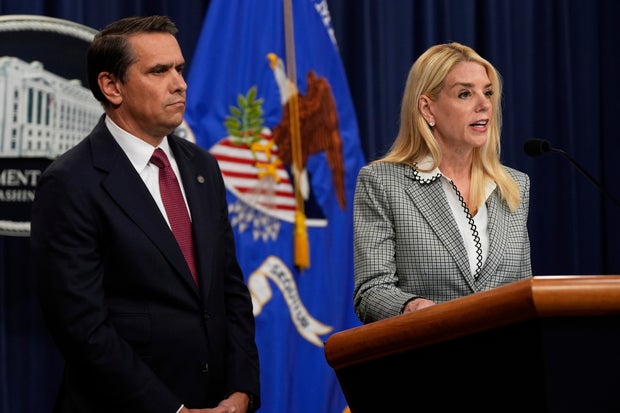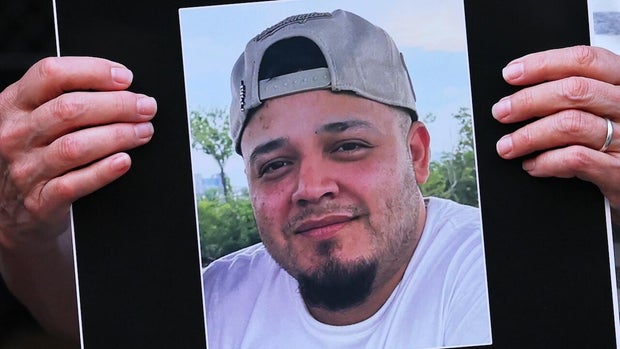Washington — Kilmar Abrego Garcia, a Salvadoran migrant who the Trump administration admitted was mistakenly deported back to his home country, has been returned to the U.S. to face two federal criminal counts that were detailed in an indictment unsealed on Friday.
Filed in the federal district court in Nashville, the indictment charges Abrego Garcia with one count of conspiracy to transport aliens and one count of unlawful transportation of undocumented aliens. Abrego Garcia was removed from the U.S. in March and flown to El Salvador, where he was initially held at a notorious supermax prison.
Attorney General Pam Bondi said in remarks at the Justice Department that the Salvadoran government agreed to return Abrego Garcia to face the criminal charges after it was presented with an arrest warrant.
“Abrego Garcia has landed in the United States to face justice,” Bondi said, adding “this is what American justice looks like.”
ABC News first reported Friday that he was being brought back to the U.S. to face the charges.
A federal grand jury returned the indictment on May 21. The Justice Department said in a court filing that Abrego Garcia should be held in pretrial custody because “he poses a danger to the community and a serious risk of flight, and no condition or combination of conditions would ensure the safety of the community or his appearance in court.”
Bondi said that the grand jury found that Abrego Garcia “played a significant role in an alien smuggling ring” that involved children and women and is “a danger to our community.” If Abrego Garcia is convicted, he would serve his sentence in the U.S. and then return to El Salvador, according to the attorney general.
The indictment
The filing alleges that between 2016 and 2025, Abrego Garcia and others conspired to bring migrants from Latin American countries to the U.S., passing through Mexico before crossing the southern border into Texas.
Prosecutors allege that Abrego Garcia and an unidentified co-conspirator picked up the migrants in Houston and transported them to other parts of the U.S., and devised “cover stories” to give to law enforcement in the event they were stopped — like transporting people for construction work.
The Justice Department said that Abrego Garcia and six co-conspirators used cellphones and social media platforms to move migrants into and throughout the U.S. He allegedly worked with two of the co-conspirators to transport firearms that were purchased illegally in Texas for distribution and resale in Maryland, where Abrego Garcia lived.
Abrego Garcia and the six others also allegedly collected financial payments from migrants for their movements, according to the indictment. That money was then transferred between one another, the Justice Department said, claiming it was an effort to hide their origins.
The indictment claims that Abrego Garcia and his co-conspirators “knowingly and unlawfully transported thousands” of migrants who were not legally authorized to live or work in the U.S., and alleges that many of those people were members of the gang MS-13 and associates.
The filing includes information about a November 2022 traffic stop in Tennessee, when Abrego Garcia was pulled over by the state Highway Patrol for speeding. The agency released body camera footage from the incident.
Abrego Garcia had at least eight people in the car with him when he was stopped. He said that they had been performing construction work at a site in St. Louis, Missouri. An April report from the Department of Homeland Security about the incident said Aberego Garcia was suspected of human trafficking, though he was not arrested or charged with any crime.
Abrego Garcia’s deportation
Abrego Garcia’s case sparked nationwide backlash after an immigration official in the Trump administration acknowledged that his deportation to El Salvador was an “administrative error.” The 29-year-old had been granted a legal status in 2019, known as withholding of removal, that forbade the Department of Homeland Security from removing him to his home country of El Salvador because he was likely to face persecution by local gangs.
Abrego Garcia was among the more than 200 people who were boarded onto planes bound for El Salvador in mid-March for confinement in the country’s notorious maximum-security Terrorism Confinement Center, known as CECOT. The removals were part of the Trump administration’s efforts to crack down on illegal immigration, which have prompted numerous legal battles across the country.
Abrego Garcia, who had lived in Maryland since he came to the U.S. unlawfully in 2011, was initially held at CECOT but eventually moved to a lower-security facility, according to Maryland Sen. Chris Van Hollen, who met with Abrego Garcia in El Salvador in April. The State Department later confirmed he had been transferred.
Van Hollen on Friday said that the Trump administration has for months been flouting the Supreme Court and the Constitution.
“Today, they appear to have finally relented to our demands for compliance with court orders and with the due process rights afforded to everyone in the United States,” he said in a statement. “As I have repeatedly said, this is not about the man, it’s about his constitutional rights — and the rights of all. The administration will now have to make its case in the court of law, as it should have all along.”
Abrego Garcia’s case, and U.S. District Judge Paula Xinis’ orders for the government to take steps to bring him back to the U.S. was the catalyst for an escalating clash between the Trump administration and the courts that has played out over the past few weeks. The government was accused of defying Xinis’ demand that it facilitate his release from Salvadoran custody — which was affirmed by the Supreme Court — and refusing to provide any details about what efforts it had taken to do so.
The Trump administration has claimed Abrego Garcia is a member of the gang MS-13, citing an allegation from a confidential informant and the clothes he was wearing when he was arrested in 2019, after which he was released from custody. His lawyers have denied Abrego Garcia has any ties to MS-13, and said he has never been charged or convicted of a crime in the U.S. or El Salvador.
Legal battle goes to Supreme Court
Three courts — the district court on which Xinis sits, a federal appeals court and the Supreme Court — all said the Trump administration had to facilitate Abrego Garcia’s release from Salvadoran custody. The Supreme Court also directed the government to ensure that his case “is handled as it would have been had he not been improperly sent to El Salvador.”
But lawyers for Abrego Garcia said the administration has defied those decisions by repeatedly refusing to take steps to bring him back to the U.S. or provide any information about whether it has even made attempts to do so.
In response, Xinis ordered an expedited examination into the Trump administration’s refusal to return Abrego Garcia to the U.S. and allowed his lawyers to pose 15 questions to government officials and make 15 requests for documents.
Abrego Garcia’s lawyers told Xinis that the Trump administration turned over “nothing of substance” and provided “non-responsive” answers to their questions. The judge then blasted the administration for its responses and blamed it for “continued mischaracterization” of the Supreme Court’s order. She said their objection to certain requests for information “reflects a willful and bad faith refusal to comply with discovery obligations.”
Regarding the administration’s attempts to invoke certain privileges to shield certain details from Abrego Garcia’s lawyers, the judge said they rely on “boilerplate assertions.”
“That ends now,” Xinis wrote.


